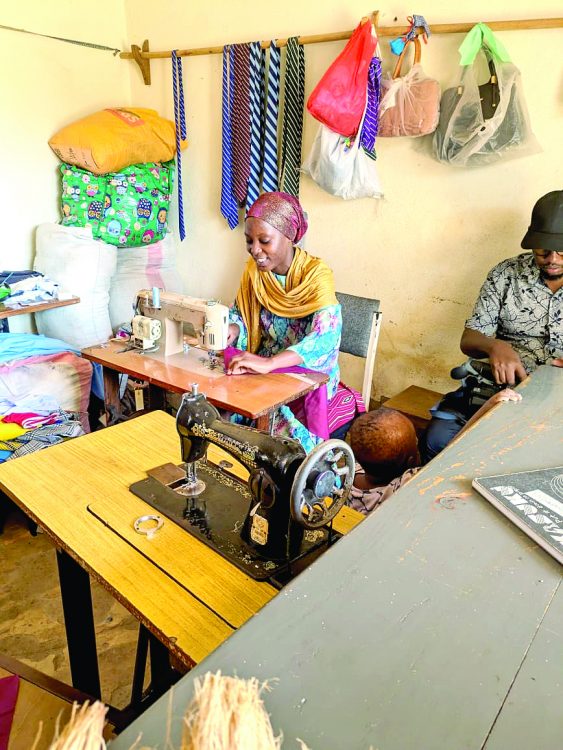On mission to give teen mums a second chance
By Munira Mandano, September 4, 2023“After being rescued from an early marriage, I couldn’t imagine going to school again. I felt embarrassed. I didn’t want to be the laughing stock of the school,” says Bintihamadi Kassim.
Kassim who hails from Tiwi, Kwale County, was married off at 16 years. Luckily, she was rescued by Sauti Ya Wanawake Pwani, a non-governmental organisation that is empowering young dropouts by enrolling them in vocational training institutions.
The girls are taught various skills such us tailoring, hair and beauty, henna and piko application, pastry among others. Armed with these skills, the girls later start their own businesses to earn a living. Many of the girls are victims of child marriage, early pregnancy or sexual violence.
Stigma plays a key role in keeping girls out of school as many of them are ashamed of resuming learning. Yet the teenage mothers become a burden to their families as they rely on their parents for livelihood. But NGOs such as Sauti Ya Wanawake Pwani and Equality Now are giving the girls a new lease of life. Kassim says she always had a passion for beauty, especially henna and piko application.
She knew if she were trained professionally, she would be able to do the job well. “My parents were very angry with me. However, Sauti ya Wanawake counsellors talked to them. They understood and even helped me join a vocational training college where I pursued a six-month course,” she recalls.
Henna and piko paintings are treasured by Coast people. They are cultural beautification for women and are mostly done for weddings. Since there are weddings every weekend, Kassim is never short of clients.
“After graduation, I started getting customers who came for henna and piko. I got many referrals and customers would come from far because my work is good and people like the patterns I draw on their hands and legs,” she adds.
Kassim can work on about 25 clients a day and charges Sh800 per client. However, for brides, the charges are higher as the designs are intricate and she has to do them keenly. The money she gets from this business has allowed her to raise her daughter. She also supports her parents in raising her younger siblings.
“I still live with my parents, so I assist them in catering for the daily family upkeep among other expenses. I also raise my child single-handedly since the father does not support me. So, my daughter is my responsibility,” she says. Saumu Saidi gave birth two years ago when she was only 15 years old.
She couldn’t continue with her education because there was no one to take care of the baby.
“I’m the first born in the family of six. My father passed away three years ago and my mother was sick and bedridden at the time. No one could take care of my baby, so I had to drop out of school,” Saidi says.
Salon business
Courtesy of Sauti ya Wanawake, she was able to pursue a tailoring course at a nearby college.
“The tailoring course took eight months. Now I’m a tailor earning a decent living,” she says.
Being the only tailor in her village, Saidi is doing well. Previously, the villagers would go to a shopping centre located several kilometres away for the tailoring services.
“I make school uniforms, dresses, trousers, shirts, among others. The money I get from this business enables me to take care of my mother’s medication, my siblings and my child’s upkeep. I’m now the bread winner in the family,” she says.
Fatuma Bakari* got a baby at the age of 17 years. However, she has always dreamt of owning a salon business.
“I only knew how to plait hair. Through Sauti ya Wanawake, I was able to improve my plaiting skills,” Bakari says.
Bakari is now a professional and can do all sorts of hair work such as braiding, hair relaxing, different hair cuts, hair dying among others.
“I now earn a living and take care of both my parents and child well. At least, I’m no longer a burden to my parents as I used to be,” she adds.
Jean Paul Murunga, End Sexual Violence Programme Officer at Equality Now, noted that the empowerment programmes help young girls become self-reliant.
“In most cases, these children come from a very poor background. When they get pregnant and eventually give birth, they become a burden to their parents who already have other children to take care of. We came up with the empowerment programmes to assist them earn a living and bring hope to the families,” Murunga said.
Short courses
So far, 15 girls have benefitted from the empowerment programmes, but the two organisations wishes to bring more on board.
“Most donors want us to do sensitisation only. But we appreciate this donor who allowed us to sponsor the girls to do short courses. These empowerment programmes assist in curbing repeat cases of sexual violence to the victim since she would be concentrating on her business,” he said.
Most of the girls in the programmes are those who have undergone sexual abuse.
“When a girl becomes a victim of sexual violence, she is normally burdened with the pregnancy which affects her psychological and even socially. We bring hope to this girl that even after all the challenges she has gone through. Life has to continue,” he said.
Murunga confirmed that the organisation is following up on 27 cases of sexual violence in Kwale.
“There are cases that are under police investigation and there are those that are in court. But the 27 are cases that have been reported to us for the last three months,” he added.
Abraham Nyamawi, a Ministry of Education officer in Msambweni, added that head teachers have a responsibility to sensitise other teachers to stop mockery and discrimination of students who have gone through sexual violence.
*Not her real name
